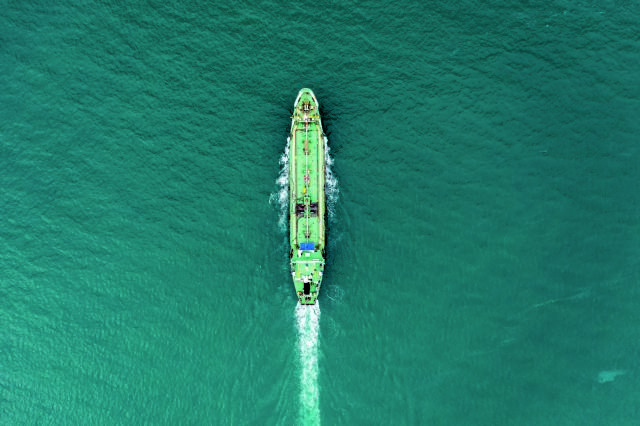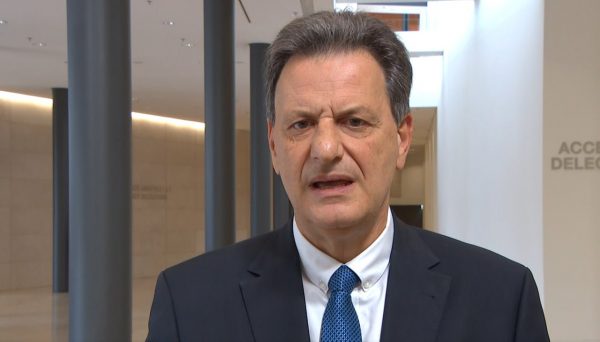
The Greek Shipowners Union welcomed the vote in the European Parliament yesterday that adopts the FuelEU Maritime regulation promoting the development of alternative fuels in shipping, as part of the decarbonization policy of the sector.
The European Parliament’s position will be brought to the attention of the European Council before it becomes official EU policy.
Shared responsibility
According to the GSU the position of the European Parliament reflects the basic principle of shared responsibility between fuel suppliers and ship operators for the use of compliant fuel. Particularly important is also the recognition, by the European Parliament, of the “polluter pays” principle and the need to create a special Fund for the decarbonisation of shipping (Ocean Fund).
Also, the Association of European Shipowners (ECSA) welcomes the adoption of the position of the European Parliament regarding the FuelEU Maritime regulation in view of the negotiations with the European Council, but noted that further steps are needed to facilitate the energy transition and decarbonisation of the shipping industry, by encouraging the production and use of low- and zero-carbon fuels.
How to reach the target
According to ECSA in order to achieve this goal, we need not only to boost the demand for clean fuels from shipping, but at the same time to recognize the responsibilities of fuel suppliers to have clean fuels available in sufficient quantities. It is also important to allocate money for reducing the price gap between conventional and clean fuels, as well as for research and development (R&D) and innovation, as well as for port infrastructure, snd also for staff training.. Therefore, European shipowners welcome the allocation of revenues from the FuelEU in the maritime sector under the EU ETS Ocean Fund.
Access to clean fuel
“Ensuring access to affordable clean fuels is a major challenge for the decarbonisation of shipping. Clean fuels currently sit on the most expensive side of the spectrum and therefore action is needed to bridge the price gap. In order to meet the targets of the FuelEU, the earmarking of the ETS and FuelEU revenues back to the sector becomes even more essential. This, together with ensuring fuel suppliers are responsible for making clean fuels available, is critical to ensure that shipping can deliver on its decarbonisation objectives” said ECSA’s Secretary General Sotiris Raptis.
The Parliament also takes a more pragmatic approach on Onshore Power Supply deleting penalties on ships when the infrastructure is not available in port. ECSA also welcomes the introduction of special conditions for ice-class vessels as well as for islands and outermost regions.
New requirements
ECSA supports the new monitoring requirements to ensure the availability of clean fuels in the market. The Commission will have to continuously monitor the quantity of low- and zero-carbon fuels made available to shipping companies in the EU. If the supply of those fuels fails to meet the demand from shipping companies, the Commission should propose measures to ensure that maritime fuel suppliers in the EU make available adequate volumes of alternative fuels to shipping companies calling at EU ports.
Latest News

DM Dendias: We talk With Turkey But We Always Bring Up Their Unacceptable Positions
Second and last day of closely watched conference, entitled 'Metapolitefsi 1974-2024: 50 Years of Greek Foreign Policy', also included appearances by PM Mitsotakis, Ex-PM Tsipras and PASOK leader Nikos Androulakis, among others

Rhodes Airport Tops Fraport Greece’s Regional Airports in 2024 Performance
According to Fraport's data, more than 35 million passengers (specifically 35.2 million) were handled by Fraport-managed airports during the 11 months.

European Central Bank Cuts Interest Rates by 25 Basis Points
It is the fourth cut of interest rates by Europe’s central bank, a move expected by the markets and financial analysts leading to the rate settling at 3%.

Airbnb: New Measures Add €600 in Extra Costs for Property Owners
Property managers face an immediate administrative fine of 5,000 euros if access to the inspected property is denied or any of the specified requirements are not met.

Economist: Greece Included in the Best Performing Economies in 2024
Meanwhile, Northern European countries disappoint, with sluggish performances from the United Kingdom and Germany.

EasyJet Expands Its Routes from Athens
The airline’s two new routes will be to London Luton and Alicante and they will commence in summer 2025.

Capital Link Forum Highlights Greece’s Economic Resurgence; Honors BoG Gov Stournaras
Capital Link Hellenic Leadership Award recipient, Bank of Greece Gov. Yannis Stournaras, an ex-FinMin, was lauded for his pivotal role during Greece’s economic recovery

Tourist Spending in Greece Up by 14%, Visa Card Analysis Shows
Greece’s capital Athens emerged as the most popular destination, recording a 17% increase in transactions with Visa cards, surpassing even the cosmopolitan island of Mykonos.

Inflation in Greece Unchanged at 2.4% in Nov. 2024
The general consumer price index (CPI) posted a 0.4% decrease in November compared to the previous month

2024 Christmas Holidays: Extended Shop Hours Schedule
The 2024 Christmas Holidays extended shop hours schedule commences on Thursday, December 12 and runs until the end of the year.


![Φυσικό αέριο: Δυναμικό come back του LNG στην Ελλάδα [γραφήματα]](https://www.ot.gr/wp-content/uploads/2023/01/OT_naturalgas-90x90.jpeg)












![Fraport: Πάνω από 35 εκατ. επιβάτες στα αεροδρόμια το 11μηνο – Πτώση στη Μύκονο [πίνακας]](https://www.ot.gr/wp-content/uploads/2022/06/fraport-90x90.jpg)


























 Αριθμός Πιστοποίησης Μ.Η.Τ.232433
Αριθμός Πιστοποίησης Μ.Η.Τ.232433